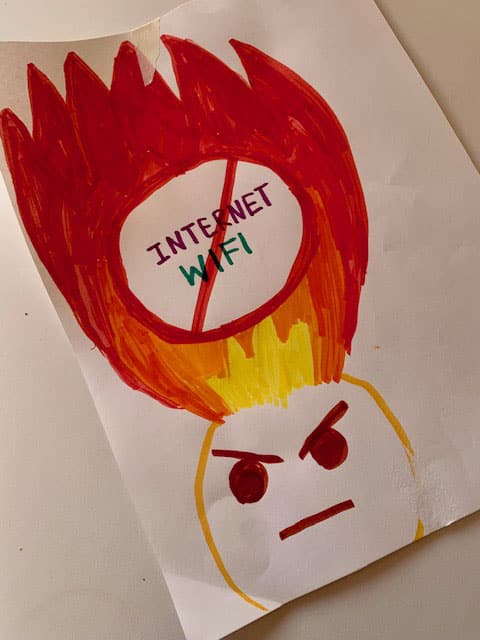 photoschmidt/Getty Images
photoschmidt/Getty Images Playing long-distance granny demands panache. Relieved of mundane activities like after-school pick-ups or dental visits, my role is to sprinkle pixie dust and leave them wanting more—never clinging or crying when it’s time to say goodbye. Now that the children are eight and 10, I’ve cooked up a new angle for their Los Angeles visits. The kids get to stay at our house, where chocolate chip pancakes are served daily and ice cream is on demand, while their parents get to sleep unencumbered at a nearby hotel where they can order breakfast in bed. This way, everyone is happy.
Unless the Internet goes out. Then everyone falls apart, as happened at our house this Thanksgiving holiday—a trauma I’m still sorting out.
I knew something was up when 10-year-old Piper showed up at my bedside at 5:30 one morning looking scared. Clutching her iPad to her chest, she said, “Grandma, the Internet’s not working,” pointing to the tiny red exclamation point at the top of her scroll to prove her point.
I couldn’t believe it. I quickly shuffled into the den, where the modem lives, and disconnected and reconnected twice, counting a minute between re-plugs. This is called rebooting. As the blinking green lights faded out, I frantically tried my phone and TV for a signal. Just like that, our connection to the ether was gone.
Moving into emergency mode, I woke my husband with words he never wants to hear: “The Internet is down. You need to get on the line with AT&T.” Then I cooked up a pile of pancakes while trying to stay calm as I figured out what to do with no television, no Internet, no music, no podcasts, no social media, no gaming—plus two young children!
Our grandkids are no more addicted to digital media than most. While relentlessly campaigning for an iPhone, Piper makes do with a tablet. Since entering pre-adolescence, chatting on a many-tentacled text with her girl’s group is the first thing she does in the morning and the last thing she does at night—seemingly for hours—behind closed bedroom doors. Similar to the way I called my best friend after school in the 1960s to debrief on every detail that had occurred each day, she is connecting with her peers, an age-appropriate rite of passage my son assures me.
Meanwhile younger brother Finn is into gaming, about which I understand next to nothing. All I know is that he was able to continue playing on his portable game unit while the Internet was down, giving him a leg up on his big sister who stopped laughing at his jokes a few months ago.
After hours on the phone, AT&T issued a verdict. The modem was dead. They promised to send us a new one—one that any idiot could connect—in one to three days. Since my son and daughter-in-law had slipped away to Mexico for a few days, we were now on our own with our increasingly anxious grandchildren. I handed my phone to Piper so she could send an alert to her friends saying, “If I’m not responding it’s not because I don’t love you. My (elderly) grandparents don’t have Internet!” Angry face emoji.
Short-circuiting without my daily dose of the New York Times digital edition, I hatched a plan. First, we expressed our emotions in an art project. Their art depicted hair on fire and smoke coming out of red-hot ears. Thinking fast, I carted the kids off to a fine chocolate shop to do a tasting for a project I was working on. In a blind-tasting, comic Finn noted that the very bitter 70% chocolate was sublime. He knows how to make me smile.
After lunch, we gathered around the kitchen table and the four of us played Scrabble. As first-time players they did well, especially when I shared the Scrabble dictionary that lives on my phone. To break-up the afternoon, we went to a real movie theater and saw “Lyle, Lyle Crocodile,” a show I had been embarrassed to go to by myself. Sadly, even with Javier Bardem as Hector P. Valenti, it was no Paddington Bear.
By bedtime, I was beat. Turning to books to bring on sleep, I grabbed the only two cartoon books I could find as we gathered together in bed. One was Roz Chast’s masterpiece about her aging parents and death. The other was a history of the comic strip “Popeye,” where I realized that the skinny sailor was in fact a brute who tossed Olive around like a punching bag. Not age appropriate. We all went to bed that night exhausted, praying for a new modem.
We all went to bed that night exhausted, praying for a new modem.
Rather than wait at the door for FedEx the next morning, we took the dog out for a walk and shot baskets. By then the kids were playing together, making each other laugh and goofing around just like the old days—when everyone wasn’t on a device. They were even snuggling close to us on the couch while we talked about their father’s teen years and my Russian grandma Babushka. She of the homemade lokshen.
By the time the modem arrived around midday, their father had returned. Within 30 minutes he had the new modem working. Everything was streaming again at lightening fast speeds. Life returned to normal.
Grandma went back to listening to podcasts on subjects as diverse as the history of the Cavendish banana and the etymology of the expression “knocked up.” My New York Times habit returned with a vengeance. Grandpa returned to watching whatever tennis/soccer/ball games were on the sports channels in the evenings. And the kids went home with a story to tell about a crazy occurrence at their grandparents’ home one Thanksgiving.
Los Angeles food writer Helene Siegel is the author of 40 cookbooks, including the “Totally Cookbook” series and “Pure Chocolate.” She runs the Pastry Session blog.























 More news and opinions than at a Shabbat dinner, right in your inbox.
More news and opinions than at a Shabbat dinner, right in your inbox.